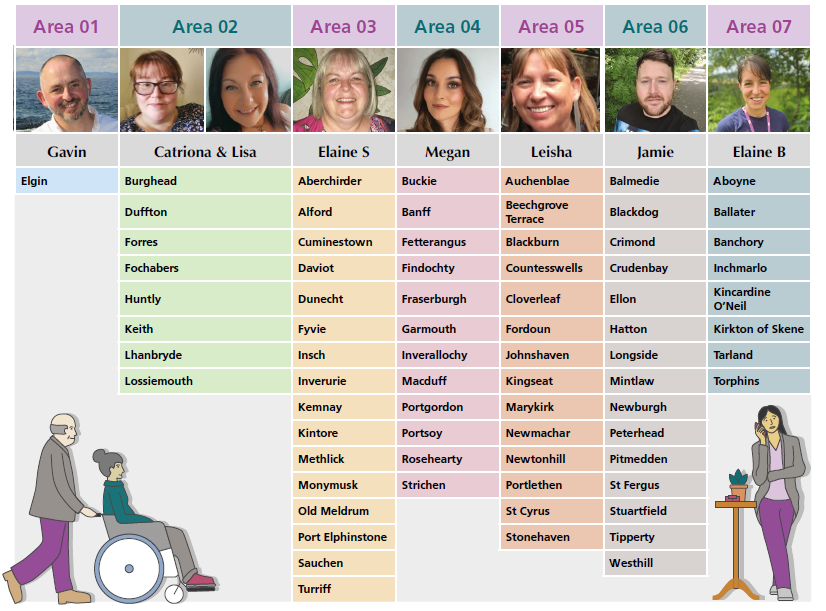Your Tenancy
Rights & Responsibilities
As a tenant you have various rights and responsibilities. As your landlord, there are also a number of things we must and can do. Your tenancy agreement sets out the conditions of your tenancy in detail. By signing it you have legally agreed to these conditions. We are happy to explain any aspect of your tenancy agreement and answer any questions you may have.
Most Osprey tenants will have a Scottish Secure Tenancy (SST). The Tenancy Agreement is based on a standard model issued by the Scottish Government. It reflects legal requirements and best housing management practice.
There are also a number of important provisions you should be aware of that may affect your tenancy. Our Managing Tenancies Policy explains each of these tenancy related changes in detail and the process associated with each process. A copy can be accessed here.
The aspects are explained below, however, more information can be found in our tenant handbook, which can be viewed here or can be accessed through the tenant portal.
Joint Tenancy
You can ask to hold your tenancy jointly with another member of your household. As a joint tenant they would be required to sign the tenancy agreement, and as such agree to all tenancy conditions. This means the property must be their only or main home. It also means they are jointly liable for all responsibilities including the payment of rent.
Household Changes
You must advise us immediately of any changes in your household. This includes letting us know if anyone no longer lives with you or anyone is moving in with you. Failure to notify us when someone moves into the property can affect their right to assignation, succession or other tenancy changes. To update your household information please complete the form here.
In the instance of relationship breakdowns if only one partner holds the tenancy the tenancy remains with that person and you will need to update the household information we hold for your tenancy – you can complete this here or contact our Customer Service Team.
In all other cases, we will deal with the matter in accordance with current legislation and the wishes of the tenants if possible. This can include assignation of tenancy or serving an abandonment on a joint tenant.
Assignation
You can ask us for permission to pass or ‘assign’ your tenancy to another member of your household. Again there are conditions relating to this, which we are happy to explain. We will not unreasonably refuse permission to assign a tenancy. We will however, carefully consider all relevant circumstances. We will for example, refuse permission if the arrangement would lead to the property becoming overcrowded or under-occupied. We may also ask you to meet other conditions.
Transfers / Exchanges
If you are an existing tenant of Osprey Housing, to be considered for an internal transfer you must register for an application through www.thesehomes.com
We will favour 25% of all vacancies for internal transfers and indicate on the advert where priority has been given for existing Osprey tenants.
You have the right to apply to ‘mutually exchange’ or legally swap homes with another tenant. They can be a tenant of any housing association or council. This can be a good way of finding another home that is more suitable for your needs. Again, we are happy to explain the detailed conditions.
Visit www.houseexchange.org.uk to view properties available for exchange or advertise your home to be considered. Please contact Osprey to receive the necessary forms for you to complete.
In the instance of both transfers and exchanges, it is important you have maintained your tenancy conditions with a clear rent account and property in good condition. If you would like to discuss your housing options, please contact your Housing Officer for more information and advice.
Ending Your Tenancy
You are required to give us at least 28 days notice to end the tenancy. This notice must be in writing by completing a tenancy termination form, as a signature is required in order to confirm that you wish to end the legal contract. You can also submit your notice via an online form here. When you advise us that you wish to leave your property, we will make an appointment to visit your home. This will allow us to fully discuss the condition of the property, and whether there will be any work to be completed for which you will have to pay the costs. This could cover things such as:
• Holes in doors or walls
• Damage to kitchen or bathroom fittings beyond reasonable wear and tear
• Removal of alteration work which has not been approved by the Group i.e. showers
You should check that your rent account is paid in full and that all keys to the property are handed in.
The property must be cleared of all furniture and belongings. Failure to do this may mean that you will be charged for the cost of removal.
Tenant Passing Away and Succession Rights
The tenancy shall pass to either the tenant’s spouse, a tenant left in the house or a member of the family over 16 years of age, providing the home has been the person’s principal residence for at least one year prior to the tenant’s death. There are exceptions to this rule – for example where property is a purpose built disabled property and there is no longer a need in the household for disabled facilities. Carers may also be considered for the tenancy if appropriate.




